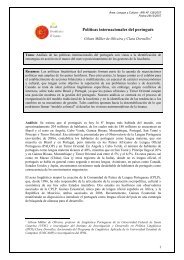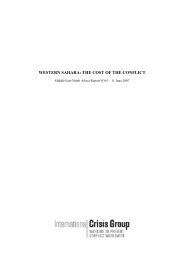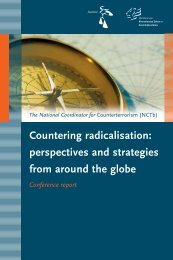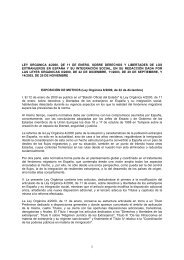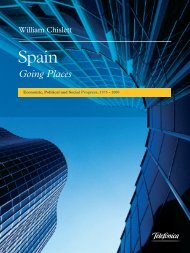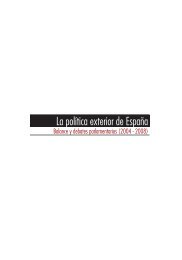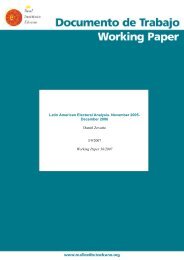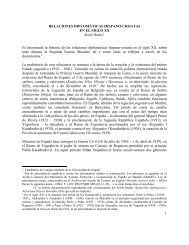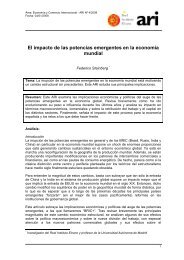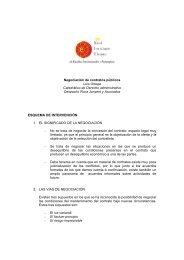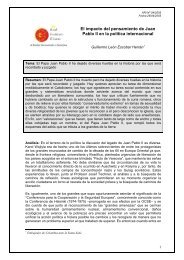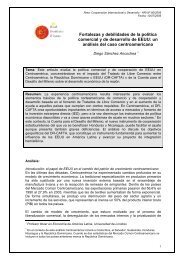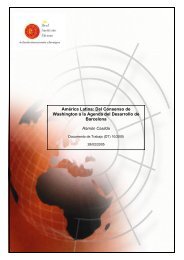Spain and the United States - Real Instituto Elcano
Spain and the United States - Real Instituto Elcano
Spain and the United States - Real Instituto Elcano
Create successful ePaper yourself
Turn your PDF publications into a flip-book with our unique Google optimized e-Paper software.
OVERVIEW 29<br />
3,631 in 2003 (<strong>the</strong> fourth largest number from Western Europe after Germany,<br />
<strong>the</strong> <strong>United</strong> Kingdom <strong>and</strong> France), according to <strong>the</strong> Institute of International<br />
Education. The flow of American students to <strong>Spain</strong> has been much greater.<br />
Their number rose from 165 in 1955 to 744 in 1960, 2,103 in 1967, 1,738 in<br />
1972, 1,894 in 1982, 8,840 in 1997 <strong>and</strong> 18,865 in 2003 (<strong>the</strong> third-largest<br />
number in <strong>the</strong> world after <strong>the</strong> <strong>United</strong> Kingdom <strong>and</strong> Italy).<br />
7. The US role during <strong>Spain</strong>’s transition to democracy, 1970-82<br />
In <strong>the</strong> revealing words of Wells Stabler, <strong>the</strong> US ambassador to <strong>Spain</strong> from 1975<br />
to 1978, <strong>the</strong> <strong>United</strong> <strong>States</strong> “really didn’t do a great deal” to develop some form<br />
of policy towards a post-Franco <strong>Spain</strong>. 27 The main – some would say <strong>the</strong> sole<br />
– concern were <strong>the</strong> bases, whose importance increased after <strong>the</strong> <strong>United</strong> <strong>States</strong><br />
was forced out of Libya in 1970. Fearful of antagonising <strong>the</strong> regime, which<br />
made a “terrible fuss” about any form of contact between <strong>the</strong> US embassy in<br />
Madrid <strong>and</strong> <strong>the</strong> opposition, however tame it might be, US diplomats had<br />
virtually no relationships with <strong>the</strong> opposition.<br />
President Richard Nixon came to Madrid in October 1970, accompanied<br />
by Henry Kissinger, head of <strong>the</strong> National Security Council, who found<br />
Franco’s <strong>Spain</strong> “as if suspended, waiting for life to end so that it could rejoin<br />
European history.” In January 1971 Prince Juan Carlos visited Washington <strong>and</strong><br />
shortly afterwards Nixon sent General Vernon Walters, deputy chief of <strong>the</strong><br />
CIA, on a secret mission to ask Franco what would happen in <strong>Spain</strong> after his<br />
death. Franco told Walters that Juan Carlos would become king without any<br />
disorder <strong>and</strong> that “<strong>the</strong> army would never let things get out of h<strong>and</strong>.” In May<br />
1975, six months before Franco died <strong>and</strong> when <strong>the</strong>re was a state of exception<br />
in two Basque provinces, President Gerald Ford visited <strong>Spain</strong>, a trip that<br />
Stabler described as achieving “absolutely nothing at all except, again from<br />
Franco’s point of view, to indicate that <strong>Spain</strong>’s big friend was rallying<br />
around.” 28 Stabler persuaded Ford <strong>and</strong> Kissinger to meet some “very tame”<br />
members of <strong>the</strong> opposition, all of whom had been at one time “violent<br />
Francoists”. But Prime Minister Carlos Arias “turned to ice” when he saw <strong>the</strong><br />
list <strong>and</strong> dem<strong>and</strong>ed <strong>the</strong> meeting be called off, which it was. Stabler believed<br />
Washington should have put its foot down. “It would have been a signal –<br />
though a very minor one – that we did have some view about relations with <strong>the</strong><br />
opposition.” The ambassador later, <strong>and</strong> on his own initiative, began to meet<br />
members of <strong>the</strong> opposition, including Felipe González, head of <strong>the</strong> Socialists<br />
27. See <strong>the</strong> “The View from <strong>the</strong> Embassy” by Wells Stabler in Authoritarian Regimes in Transition, edited<br />
by Hans Binnendijk (Centre for <strong>the</strong> Study of Foreign Affairs, US Department of State, 1987).<br />
28. Ibid.



